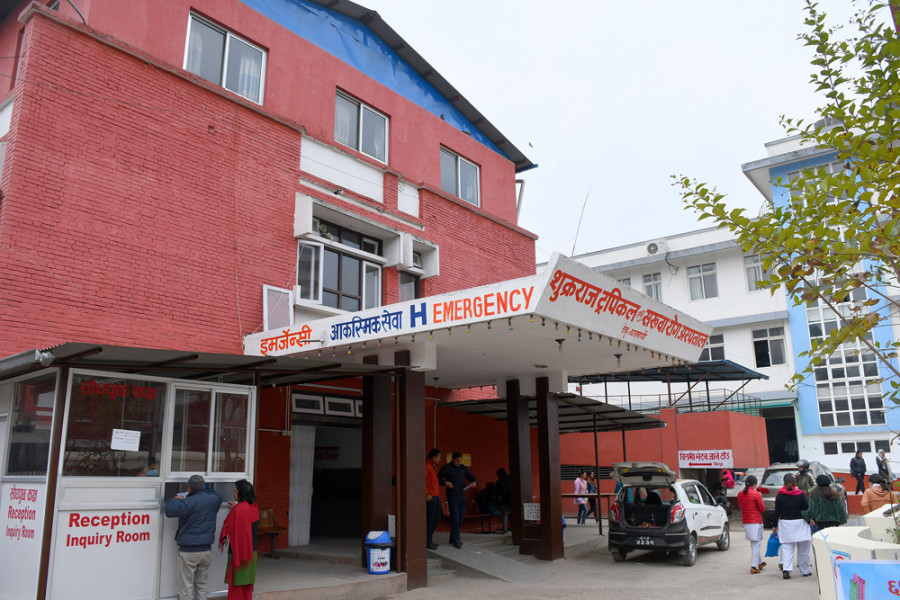Health
Fear of Covid-19 and overlapping symptoms increase risk of late diagnosis of seasonal ailments
Doctors say fatalities will increase from seasonal diseases if not treated on time.
Arjun Poudel
On Sunday, a man in his early 30s visited Sukraraj Tropical and Infectious Disease Hospital in Teku with fever, headache and cough.
The man from Dhading complained that he was forced to come to Kathmandu, as health workers in his district refused to examine him, saying that most of his symptoms matched those of Covid-19 and they do not have personal protective equipment.
Doctors at Sukraraj Hospital recommended polymerase chain reaction tests on the patient's specimens and a report is yet to come, but they say that the man is most likely to be infected with dengue.
"Dengue season has already started and most of the symptoms—fever, chest pain and cough—match with Covid-19," said Dr Sher Bahadur Pun, chief of the clinical research unit at the hospital. Chances of late diagnosis or delayed treatment rise due to the overlapping symptoms, making common seasonal ailments life-threatening.
Some symptoms of diarrheal diseases and malaria also trigger suspicions of Covid-19, which increases the chance of health workers not attending patients fearing infection.
The Epidemiology and Disease Control Division said that over 100 dengue cases have been reported from 26 districts including in Kathmandu Valley. Cases of scrub typhus and malaria have been reported from various places including quarantine facilities set up across the country.
Officials at the division said that all cases might not have been reported due to the pandemic, as the dengue epidemic had peaked in mid-June last year. At least six people had died and over 16,000 got infected with dengue then.
"At a time when we all are focussed on containing Covid-19, multiple problems arise at once, " Dr Basudev Pandey, director at the division, told the Post. "Both vector-borne and water-borne diseases have started to rise.We have alerted our health workers on the potential outbreak of seasonal diseases."
Monsoon is considered an epidemic season in Nepal, as thousands of people from across the country get infected with dengue, malaria, kala-azar, scrub typhus, Japanese encephalitis, jaundice, typhoid diarrhea, and cholera.
Incidents of landslides, floodings and snakebites have also started to be reported from various districts, according to the division. Pandey agrees that the risk of late diagnosis of the seasonal ailments has increased due to the Covid-19 risk.
Earlier, the division imparted training to medics serving in state-run health facilities across the country, supplied testing kits and kept medicines in stock in view of the outbreaks. Due to the Covid emergency, the division has not been able to conduct training for health workers this year.
"Lila Bikram Thapa, senior public health administrator at the division, said: "We have conducted Zoom meetings with provincial and district level officials and alerted them about the possible outbreak of seasonal diseases."
Most health facilities lack personal protective equipment. Doctors say that chances of disease being spread by healthcare providers will be high if they themselves get infected.
Thapa said health workers have been directed to perform tests for malaria, dengue and other diseases taking precautionary measures.
Besides, the return of thousands of people in the epidemic season has become a headache for officials as 30 imported cases of malaria have been reported in quarantine centres so far.
Uttam Raj Pyakurel, a vector control inspector at the division, said the government lacks even mosquito nets in sufficient numbers to be provided to all people who have returned from abroad.
"Detection of imported malaria cases and lack of sufficient mosquito nets are a cause for concern," said Pokhrel. "We have asked health officials to conduct malaria and other tests for all suspects."
Dr Baburam Marasini, former director at the Epidemiology and Disease Control Division, said more people will die from seasonal ailments if the authorities fail to pay proper attention to the risk.
"We should not ignore the risk of seasonal ailments on the pretext of focussing on Covid-19,"said Marasini.




 9.89°C Kathmandu
9.89°C Kathmandu















